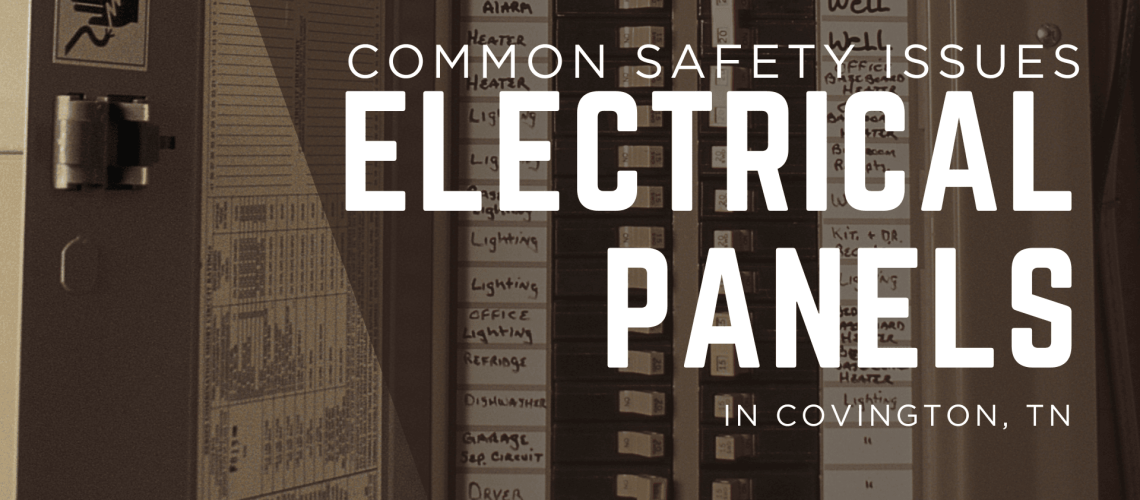The electrical system is one of the most important — and potentially dangerous — parts of any home. It powers everything from lights and appliances to HVAC systems, but it can also pose serious safety hazards if it’s not installed or maintained properly.
During a home inspection in Covington, Tennessee, the electrical panel (often called the “breaker box”) is one of the first components I examine. It serves as the control center for the entire electrical system — distributing power, protecting circuits, and preventing overloads.
Unfortunately, many homes in Tipton County still have aging or improperly modified panels that could lead to shocks, fires, or costly repairs down the road.
Why Electrical Panels Deserve Close Attention
Electricity is invisible — and that’s part of what makes it so dangerous. You can’t see a loose connection, corrosion, or overheating breaker until it’s too late. That’s why a professional inspection focuses not only on whether power works, but whether it works safely.
A typical inspection includes:
- Identifying the panel brand and type
- Checking for proper grounding and bonding
- Verifying that breakers match wire sizes
- Looking for signs of overheating or arcing
- Confirming proper labeling and accessibility
- Inspecting visible wiring and connections
In older Covington homes, it’s not uncommon to find panels that have been added onto over the years — sometimes by unlicensed handymen or during DIY remodels. Those are the systems that tend to hide the most problems.
Common Electrical Panel Defects Found in West Tennessee Homes
⚡ 1. Double-Tapped Breakers
A “double tap” occurs when two wires are connected under one screw terminal that’s only designed for one. This can cause loose connections, overheating, or arcing. It’s one of the most frequent electrical defects I report.
🔥 2. Over-Fusing or Mismatched Breakers
When a breaker’s amperage rating exceeds the wire size it’s protecting — for example, a 40-amp breaker on a 30-amp circuit — the wire can overheat long before the breaker trips. This is a serious fire hazard.
🧲 3. Missing Ground or Bonding
Proper grounding and bonding protect against electrical shock and help safely discharge lightning or static buildup. In older homes, grounding may be missing or improperly connected.
⚙️ 4. Rust, Corrosion, or Moisture in the Panel
In humid West Tennessee crawlspaces and garages, moisture can enter the panel enclosure, leading to rusted breakers or terminals. Corrosion reduces conductivity and may cause intermittent power loss.
🔌 5. Obsolete or Recalled Panels
Some panel brands — like certain Federal Pacific Electric (FPE) and Zinsco models — have known safety defects and may fail to trip during an overload. These panels are no longer UL-listed and should be replaced immediately.
🧰 6. Improper Knockouts or Missing Covers
Small gaps or missing knockout plugs expose live wiring, which can shock anyone working near the panel. I often see this after DIY electrical additions or cable upgrades.
Age Matters: Electrical Systems and Older Homes
Covington has a mix of older neighborhoods with mid-century homes and newer subdivisions on the outskirts. Homes built before the 1980s often have outdated components such as aluminum wiring, two-prong outlets, or undersized panels that no longer meet today’s demand.
A modern household uses far more electricity than homes did decades ago. High-efficiency appliances, smart devices, and HVAC systems all require stable, properly sized circuits. When older panels aren’t upgraded, tripped breakers and overheating become regular occurrences.
If your home’s electrical panel is more than 30 years old, it’s worth having it inspected — even if everything “seems to work.”
What Home Buyers Should Know
During a home inspection, electrical defects are often listed as safety concerns rather than cosmetic issues. Even small problems can lead to big consequences if left uncorrected.
For homebuyers, this means:
- Never skip an inspection, even on newer homes — builders and electricians make mistakes too.
- Request documentation if the panel has been upgraded.
- Ask about permits for past electrical work.
- Use licensed electricians for all repairs or improvements.
An inspector’s report will clearly identify which items are safety hazards and which are simple maintenance issues — helping you prioritize repairs before or after purchase.
How Upchurch Inspection Helps
At Upchurch Inspection, I perform detailed electrical evaluations as part of every standard home inspection. Using voltage testers, thermal imaging (when applicable), and visual assessments, I check for both safety and functionality.
When defects are found, I provide clear explanations and recommend licensed electrical contractors for corrective work. My goal is to ensure your home in Covington or anywhere in West Tennessee is safe, functional, and compliant with current standards.
⚡ Schedule Your Covington Home Inspection Today
Serving Covington, Brighton, Munford, and surrounding Tipton County communities, Upchurch Inspection provides certified home inspections, electrical evaluations, and specialized testing for mold, radon, water quality, and sewer systems.
📞 Call (901) 350-8885 or visit UpchurchInspection.com to schedule your inspection today.


